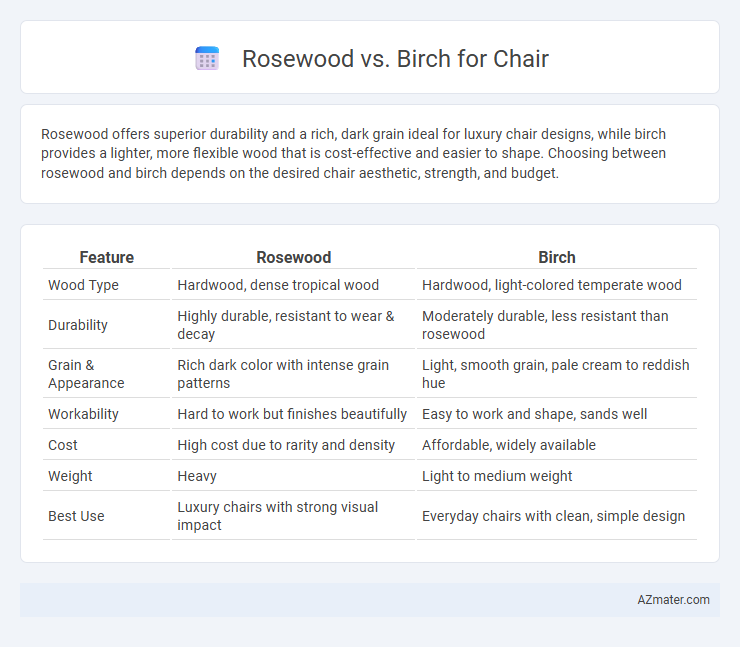Rosewood offers superior durability and a rich, dark grain ideal for luxury chair designs, while birch provides a lighter, more flexible wood that is cost-effective and easier to shape. Choosing between rosewood and birch depends on the desired chair aesthetic, strength, and budget.
Table of Comparison
| Feature | Rosewood | Birch |
|---|---|---|
| Wood Type | Hardwood, dense tropical wood | Hardwood, light-colored temperate wood |
| Durability | Highly durable, resistant to wear & decay | Moderately durable, less resistant than rosewood |
| Grain & Appearance | Rich dark color with intense grain patterns | Light, smooth grain, pale cream to reddish hue |
| Workability | Hard to work but finishes beautifully | Easy to work and shape, sands well |
| Cost | High cost due to rarity and density | Affordable, widely available |
| Weight | Heavy | Light to medium weight |
| Best Use | Luxury chairs with strong visual impact | Everyday chairs with clean, simple design |
Introduction: Comparing Rosewood and Birch for Chairs
Rosewood offers exceptional durability and rich, dark tones that enhance the aesthetic of high-end chairs, making it a preferred choice for luxury furniture. Birch provides a lighter, more affordable alternative with a smooth grain and good strength, suitable for contemporary and minimalist chair designs. Understanding the differences in hardness, grain patterns, and cost between rosewood and birch helps in selecting the ideal material for chair construction.
Wood Grain and Aesthetic Differences
Rosewood features a rich, dark grain with dramatic, swirling patterns that create a luxurious and exotic appearance, making it highly sought after for statement furniture pieces. In contrast, birch offers a lighter, more uniform grain with subtle, fine lines and a smooth texture, lending a clean, modern aesthetic ideal for minimalist or Scandinavian-style chairs. The contrast between rosewood's bold visual depth and birch's understated elegance significantly influences the overall design and ambiance of chair creations.
Durability and Longevity of Rosewood vs Birch
Rosewood offers superior durability and longevity compared to birch due to its dense hardwood structure and natural resistance to wear and moisture, making it an ideal choice for long-lasting chairs. Birch, while also a strong hardwood, tends to be softer and less resistant to dents and scratches, which may reduce the chair's lifespan under heavy use. The high oil content in rosewood further enhances its resistance to decay and warping, providing a more stable and enduring material for furniture.
Weight and Workability Factors
Rosewood offers a dense and heavy material ideal for sturdy chair construction but can be challenging to work with due to its hardness and tendency to dull tools quickly. Birch provides a lighter weight option, facilitating easier handling and quicker machining with excellent sandability, making it suitable for intricate chair designs. The workability of birch enhances productivity, whereas rosewood's durability and rich grain make it preferable for high-end, long-lasting seating furniture.
Cost Comparison: Rosewood vs Birch Chairs
Rosewood chairs typically cost significantly more than birch chairs due to the rarity and density of rosewood, which increases production expenses. Birch chairs, being made from more abundant and readily available timber, offer a budget-friendly option without compromising strength and durability. The price difference can range from 30% to 70%, making birch a preferred choice for cost-conscious buyers seeking quality.
Comfort and Ergonomics Analysis
Rosewood offers a dense, durable structure that provides firm support and stability for chairs, enhancing overall posture and reducing strain during prolonged use. Birch, while slightly softer, delivers excellent flexibility and shock absorption, contributing to a more comfortable seating experience by adapting subtly to body movements. Ergonomically, rosewood chairs favor long-term rigidity and support, whereas birch chairs excel in contouring comfort and responsiveness, making each wood type suitable for specific user preferences and needs.
Sustainability and Environmental Impact
Rosewood, often sourced from endangered tropical forests, poses significant sustainability concerns due to illegal logging and habitat destruction, leading to strict export regulations and certifications. Birch, a fast-growing hardwood commonly found in North America and Europe, offers a more eco-friendly alternative with better regeneration rates and lower environmental impact during harvesting. Choosing birch for chairs supports responsible forestry practices and reduces the carbon footprint compared to rosewood.
Maintenance and Care Requirements
Rosewood chairs demand regular polishing to maintain their deep, rich color and natural oils, which protect the wood from drying out and cracking. Birch chairs require more frequent cleaning and occasional sealing, as their lighter color is prone to stains and scratches without proper care. Both woods benefit from avoiding excessive moisture and direct sunlight to extend the chair's life and appearance.
Best Use Cases for Rosewood and Birch Chairs
Rosewood chairs excel in luxury settings such as executive offices and formal dining rooms due to their rich color, durability, and intricate grain patterns that enhance aesthetic appeal. Birch chairs offer great value for casual or contemporary environments, including kitchen seating and children's furniture, thanks to their light color, smooth texture, and affordability. Both woods provide strong structural integrity but differ in ideal applications based on style preferences and usage intensity.
Conclusion: Which Wood is Ideal for Your Chair?
Rosewood offers exceptional durability, rich color, and natural resistance to wear, making it ideal for high-end, long-lasting chairs that prioritize elegance and strength. Birch provides a lighter, more affordable option with fine grain and good stability, suitable for chairs needing a bright finish and moderate use. Choose rosewood for luxury and durability, while birch is perfect for budget-friendly, stylish chairs with moderate durability requirements.

Infographic: Rosewood vs Birch for Chair
 azmater.com
azmater.com